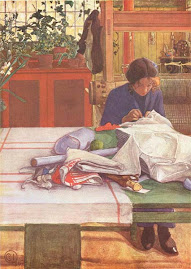Don’t get the idea, though, that I reject TV in and of itself in some sort of knee-jerk reaction. Ransom Fellowship first awakened me to the idea that movies are the stories of our culture. Every culture has had its stories, once told around the flickering campfire at night, now told on a glowing screen—but we still have stories that not only entertain us, but impact and shape us as well. As disgusted as I get with some aspects of TV, as determined as I am to not make that a part of my children’s lives at an early age, the limited amount of TV that Billy and I have allowed into our lives has been beneficial to me on many fronts. Most notably, it’s given me a window into our culture and how people in our society think and why. After all, a postmodern culture will tell stories that reflect its values. I don’t expect non-Christians to write Christian stories, and the stories they tell and treasure help me to understand them.
It’s also enabled me to better live in the world without being of it, to be a better friend and a better witness to those who live outside Christianity. I know something of what my neighbors watch, what forms their values, what touches their hearts, what makes them tick, why they are the way they are. It’s broadened my thinking and enabled me to see the unbelieving world as people, not just ideologies. It’s provided me with another way to converse with and identify with those next to whom my tent is pitched. I’d even go so far as to say that one it’s difficult to effectively be a missionary to our postmodern Western society without having at least a rudimentary understanding of pop culture. That’s something I work on constantly, and watching limited TV and movies with discernment is one way I’ve been able to move toward greater understanding.
Honestly, I love movies, both for their artistic and entertainment value and for the insight I gain from them.. I just don’t want them to replace real life, real relationships, real activities. I don’t want my children to become reliant on them for entertainment or to have their values shaped by TV and film, which too often (not always) present life in a way that violates all the values I hold dear. But I’m grateful that it’s something I can experience from time to time now that I’m mature enough not to be controlled or shaped by it.
One of my favorite writers, EB White, (author of Charlotte’s Web) wrote about TV in a newspaper piece entitled “Removal” in July 1938. TVs were just becoming available to families at home. I found his insight amazing. He accurately predicted what TV would do to our culture, long before time had proven him correct. He said this:
“…I believe television is going to be the test of the modern world, and that in this new opportunity to see beyond the range of our vision we shall discover either a new and unbearable disturbance of the general peace or a saving radiance in the sky. We shall stand or fall by television—of that I am quite sure…Clearly the race today is between loud speaking and soft, between the things that are and the things that seem to be, between the chemist of RCA and the angel of God. Radio has already given sound a wide currency, and sound ‘effects’ are taking the place once enjoyed by sound itself. Television will enormously enlarge the eye’s range, and, like radio, will advertise the Elsewhere. Together with the tabs, the mags, and the movies, it will insist that we forget the primary and the near in favor of the secondary and the remote. More hours in every twenty-four will be spent digesting ideas, sounds, images—distant and concocted. In sufficient accumulation, radio sounds and television sights may become more familiar to us than their originals. A door closing, heard over the air; a face contorted, seen in a panel of light—these will emerge as the real and the true; and when we bang the door of our own cell or look into another’s face the impression will be of mere artifice.”
So I encourage those who might have considered drastically reducing or even eliminating TV in their homes not to hesitate, particularly if they have small children. Of course, when they pull the plug on the TV, the kids will be bored for a few days, and the grown ups might be too. But don’t worry, that passes. In short order the family does more together, the kids are more content and creative, and relationships with each other are richer. For those who feel hesitant, why not try it for a month? If family life isn’t better, just plug the TV back in.
For those who choose to continue to watch TV and movies, it’s important to watch with discernment, a healthy critical eye. We must watch in a way that enriches our spiritual lives, allow it to be a window into the values of the culture, and measure it against the Word of God. As missionaries to our culture, we can use it as a springboard for discussion.
Either way, we’re challenging the cultural norm. I feel it’s safe to say, though, that we won’t be sorry.
Tuesday, November 29, 2005
Subscribe to:
Post Comments (Atom)







No comments:
Post a Comment